湖南师大附中2015-2016学年高一下学期期中考试 英语(word文档,答案图片版)
湖南师大附中高一下册考试英语有答案【精选】.doc
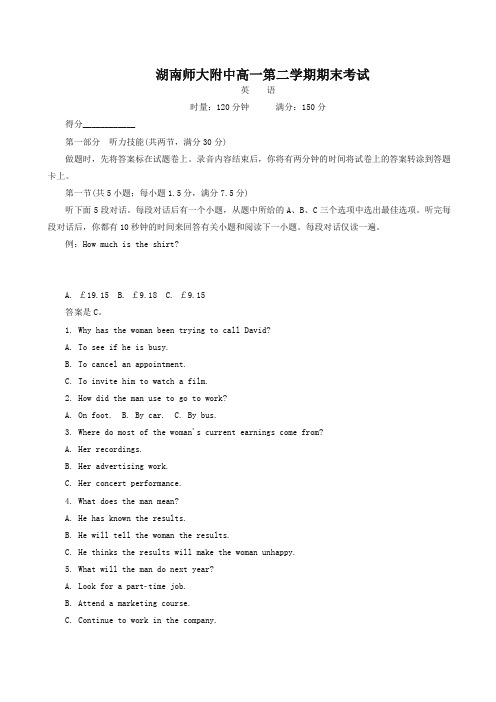
湖南师大附中高一第二学期期末考试英语时量:120分钟满分:150分得分____________第一部分听力技能(共两节,满分30分)做题时,先将答案标在试题卷上。
录音内容结束后,你将有两分钟的时间将试卷上的答案转涂到答题卡上。
第一节(共5小题;每小题1.5分,满分7.5分)听下面5段对话。
每段对话后有一个小题,从题中所给的A、B、C三个选项中选出最佳选项。
听完每段对话后,你都有10秒钟的时间来回答有关小题和阅读下一小题。
每段对话仅读一遍。
例:How much is the shirt?A. £19.15B. £9.18C. £9.15答案是C。
1. Why has the woman been trying to call David?A. To see if he is busy.B. To cancel an appointment.C. To invite him to watch a film.2. How did the man use to go to work?A. On foot.B. By car.C. By bus.3. Where do most of the woman's current earnings come from?A. Her recordings.B. Her advertising work.C. Her concert performance.4. What does the man mean?A. He has known the results.B. He will tell the woman the results.C. He thinks the results will make the woman unhappy.5. What will the man do next year?A. Look for a parttime job.B. Attend a marketing course.C. Continue to work in the company.第二节 (共15小题;每小题1.5分,满分22.5分)听下面5段对话或独白。
学15—16学年下学期高一期中考试英语试题(附答案)

2015-2016学年度第二学期第二次阶段考试高一英语试题本试卷分第I 卷(选择题)和第II 卷(非选择题)两部分。
第I 卷(共110分)第一部分:听力(共两节,满分20分)第一节(共5小题;每小题1分,满分5分)听下面5段对话。
每段对话后有一个小题,从题中所给的A、B、C三个选项中选出最佳选项,并标在试卷的相应位置。
听完每段对话后,你都有10秒钟的时间来回来有关小题和阅读下一小题。
每段对话仅读一遍。
1. How is the weather in the woman’s opinion?A. Warm.B. Cold.C. Hot.2. What does the man mean?A. He already has plans.B. The woman should decide.C. He will make a reservation.3. Why did the man go to Beijing?A. To visit his parents.B. To have an interview.C. To receive job training.4. What are the two speakers talking about?A. What to take up as a hobby.B. How to keep fit.C. How to handle pressure.5. What will the man do first?A. Tidy his room.B. Go on a picnic.C. Wear clothes.第二节(共15小题;每小题1分,满分15分)听下面5段对话。
每段对话后有几个小题,从题中所给的A、B、C三个选项中选出最佳选项,并标在试卷的相应位置。
听每段对话前,你将有时间阅读各个小题,每小题5秒钟;听完后,各小题将给出5秒钟的作答时间。
每段对话读两遍。
湖南省娄底市2015-2016学年高一下学期期中考试英语试题

2015-2016年下学期高一期中考试英语第Ⅰ卷第一部分听力(共两节,满分20分)第一节(共5小题;每小题1分,满分5分)听下面5段对话,每段对话后有一个小题,从题中所给的A、B、C三个选项中选出最佳选项,并标在试卷的相应位置,听完每段对话后,你都有10秒钟的时间来回答有关小题和阅读下一小题。
每段对话仅读一遍。
1. What will the woman do first?A.Have breakfast.B. Buy a book.C. Go to the supermarket.2. How much should a student pay for the rent each month?A. About 160 dollars.B. About 100 dollars.C. About 80 dollars.3. What will the weather probably be like this afternoon?A. Rainy.B. Snowy.C. Sunny.4. How many places will the woman go to?A. Three.B. Two.C. Four.5. What is the manager doing now?A. Having a talk with the man.B. Reading today’s newspaper.C. Making a phone call.第二节(共15小题;每小题 1 分,满分15分)听下面5 段对话或独白。
每段对话或独白后有几个小题,从题中所给的A、B、C 三个选项中选出最佳选项,并标在试卷的相应位置。
听每段对话或独白前,你将有时间阅览室读各个小题,每小题5秒钟;听完后,各小题将给出5秒钟的作答时间。
每段对话或独白读两遍。
听第6段材料,回答第6、7题。
6. Who has probably read the book named The Woman in Black?A. Allan.B. Alice.C. Michael.7. What will the speakers do this Friday?A.Read the book.B. Watch the film.C. See the poster.听第7段材料,回答第8、9题。
湖南师大附中2015-2016学年高一下学期期中考试英语试题含答案
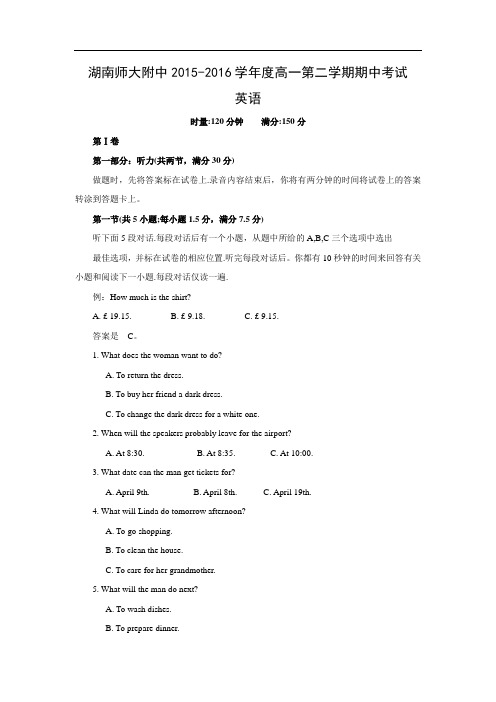
湖南师大附中2015-2016学年度高一第二学期期中考试英语时量:120分钟满分:150分第Ⅰ卷第一部分:听力(共两节,满分30分)做题时,先将答案标在试卷上.录音内容结束后,你将有两分钟的时间将试卷上的答案转涂到答题卡上。
第一节(共5小题;每小题1.5分,满分7.5分)听下面5段对话.每段对话后有一个小题,从题中所给的A,B,C三个选项中选出最佳选项,并标在试卷的相应位置.听完每段对话后。
你都有10秒钟的时间来回答有关小题和阅读下一小题.每段对话仅读一遍.例:How much is the shirt?A. £ 19.15.B. £ 9.18.C. £ 9.15.答案是C。
1. What does the woman want to do?A. To return the dress.B. To buy her friend a dark dress.C. To change the dark dress for a white one.2. When will the speakers probably leave for the airport?A. At 8:30.B. At 8:35.C. At 10:00.3. What date can the man get tickets for?A. April 9th.B. April 8th.C. April 19th.4. What will Linda do tomorrow afternoon?A. To go shopping.B. To clean the house.C. To care for her grandmother.5. What will the man do next?A. To wash dishes.B. To prepare dinner.C. To watch a show.第二节(共15小题;每小题1.5分,满分22.5分)听下面5段对话或独白.每段对话或独白后有几个小题,从题中所给的A,B,C三个选项中选出最佳选项.并标在试卷的相应位置。
2021-2022学年湖南师大附中高一下学期期中考试 英语 试题(含答案)
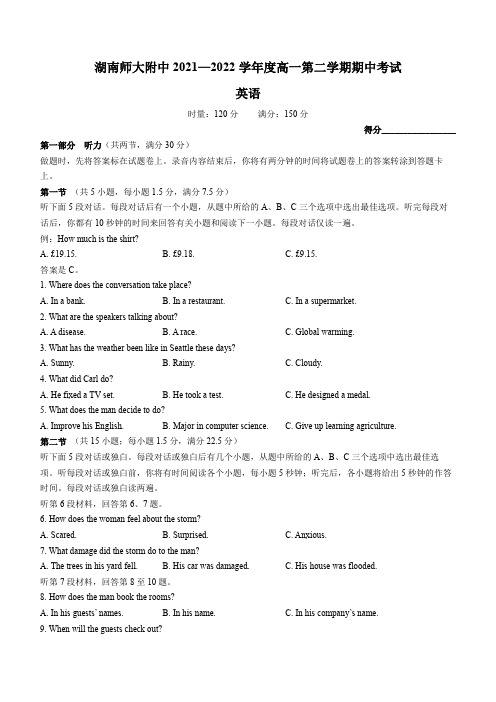
湖南师大附中2021—2022学年度高一第二学期期中考试英语时量:120分满分:150分得分_________________第一部分听力(共两节,满分30分)做题时,先将答案标在试题卷上。
录音内容结束后,你将有两分钟的时间将试题卷上的答案转涂到答题卡上。
第一节(共5小题,每小题1.5分,满分7.5分)听下面5段对话。
每段对话后有一个小题,从题中所给的A、B、C三个选项中选出最佳选项。
听完每段对话后,你都有10秒钟的时间来回答有关小题和阅读下一小题。
每段对话仅读一遍。
例:How much is the shirt?A. £19.15.B. £9.18.C. £9.15.答案是C。
1. Where does the conversation take place?A. In a bank.B. In a restaurant.C. In a supermarket.2. What are the speakers talking about?A. A disease.B. A race.C. Global warming.3. What has the weather been like in Seattle these days?A. Sunny.B. Rainy.C. Cloudy.4. What did Carl do?A. He fixed a TV set.B. He took a test.C. He designed a medal.5. What does the man decide to do?A. Improve his English.B. Major in computer science.C. Give up learning agriculture.第二节(共15小题;每小题1.5分,满分22.5分)听下面5段对话或独白。
每段对话或独白后有几个小题,从题中所给的A、B、C三个选项中选出最佳选项。
15—16学年下学期高一期中考试英语试题(附答案)
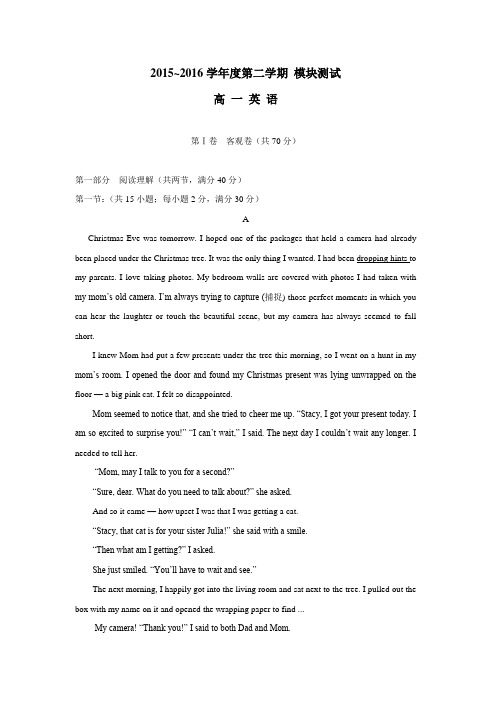
2015~2016学年度第二学期模块测试高一英语第Ⅰ卷客观卷(共70分)第一部分阅读理解(共两节,满分40分)第一节:(共15小题;每小题2分,满分30分)AChristmas Eve was tomorrow. I hoped one of the packages that held a camera had already been placed under the Christmas tree. It was the only thing I wanted. I had been dropping hints to my parents. I love taking photos. My bedroom walls are covered with photos I had taken with my mom’s old camera. I’m always trying to capture (捕捉) those perfect moments in which you can hear the laughter or touch the beautiful scene, but my camera has always seemed to fall short.I knew Mom had put a few presents under the tree this morning, so I went on a hunt in my mom’s room. I opened the door and found my Christmas present was lying unwrapped on the floor — a big pink cat. I felt so disappointed.Mom seemed to notice that, and she tried to cheer me up. ―Stacy, I got your present today. I am so excited to surprise you!‖ ―I can’t wait,‖ I said.The next day I couldn’t wait any longer. I needed to tell her.―Mom, may I talk to you for a second?‖―Sure, dear. What do you need to talk about?‖ she asked.And so it came — how upset I was that I was getting a cat.―Stacy, that cat is for your sister Julia!‖ she said with a smile.―Then what am I getting?‖ I asked.She just smiled. ―You’ll have to wait and see.‖The next morning, I happily got into the living room and sat next to the tree. I pulled out the box with my name on it and opened the wrapping paper to find ...My camera! ―Thank you!‖ I said to both Dad and Mom.Dad picked up the camera and took a picture of Julia, Mom and me. It has become one of my favorite pictures. Just on that Christmas morning, I took lots of photos with my camera —my little sister making a face, my parents giving me a soft smile — and all of these photos have come to mean one thing to me: love.1. The underlined phrase ―dropping hints‖ in Paragraph 1 means _____.A. talking oftenB. suggesting indirectlyC. sending presentsD. taking pictures2. Why did Stacy feel disappointed at first?A. Her mother couldn’t understand her at all.B. Her mother didn’t buy her any Christmas gift.C. She didn’t find her present in her mom’s room.D. She mistook her sister’s Christmas gi ft for hers.3. We can infer from the passage that _____.A. her mother bought Stacy a camera after discovering her disappointmentB. Stacy finally got her gift on Christmas EveC. Stacy thought it’s OK to have an old cameraD. her mother knew what gift Stacy wanted for Christmas4. What would be the best title for the passage?A. A Christmas gift as wished.B. Love is more important than gifts.C. A wonderful Christmas.D. Love can not be bought.BWhat are you feeling right now as you start to read this? Are you curious? Hoping that you’ll learn something about yourself? Bored because this is something you have to do for school and you’re not really into it —or happy because it’s a school project you enjoy? Perhaps you’re attracted by something else, like feeling excited about your weekend plans or sad because you just went through a breakup.Emotions like these are part of human nature. They give us information about what we’re experiencing and help us know how to react. We sense our emotions from the time we’re babies. Young children react to their emotions with facial expressions or with actions like laughing orcrying. They feel and show emotions, but they don’t yet have the ability to name the emotion or say why they feel that way.As we grow up, we become more skilled in understanding emotions. Instead of just reacting like little kids do, we can identify(定义)what we feel and put it into words. With time and practice, we get better at knowing what we are feeling and why. This skill is called emotional awareness.Emotional awareness helps us know what we need and want, or don’t want! It helps us build better relationships. That’s because being aware of our emotions can help us talk about feelings more clearly, avoid or settle conflicts(冲突)better, and move past difficult feelings more easily.Some people are naturally more in touch with their emotions than others. The good news is that everyone can be more aware of their emotions. It just takes pract ice. But it’s worth the effort.Emotional awareness is the first step toward building emotional intelligence, a skill that can help people succeed in life.5. How do young children react to emotions?A. With laughter and shouts.B. With signs and expressions.C. With facial expressions and actions.D. With gestures of different kinds.6. From the passage we know that emotional awareness actually _________.A. enables us to live in society more easilyB. lets people understand others betterC. brings about conflicts between peopleD. smooths away difficulties in our life7. Where is the passage probably taken from?A. A science fiction.B. An advertisement.C. A science magazine.D. A television show.CEnglish is fast becoming the language of science around the world, but what is its future among everyday speakers? One expert points out that the percentage(比率) of native English speakers is declining(降低) while the languages of other rapidly growing regions are being spoken by increasing numbers of people. But English will continue to remain widespread and important.However, British language scholar David Graddol says English will probably drop in dominance(主导) by the middle of this century to rank after Chinese, about equally with Arabic, Hindi, and Urdu. ―The number of people speaking English as a first language continues to rise, but it isn’t rising nearly as fast as the numbers of many other languages around the world, simply because the main population group has been largely in the less developed countries where languages other than English have been spoken,‖ he says.In a recent article in the journal Science, Mr. Graddol noted that three languages that are not near the top of the list of the most widely spoken now might be there soon. These are Bengali, Tamil, and Malay, spoken in south and southeast Asia.David Crystal, the author of the Cambridge Encyclopedia of the English Language, says about 1.5 billion of the world’s six billion people speak it as a second language compared to the 400 million native speakers. But another expert on the English language says Mr. Graddol underestimates (低估) the future of its dominance. ―All the evidence suggests that the English language snowball is rolling down a hill and is getting faster, but nobody quite knows what’s going to happen because no language has been in this position before.‖ he said.8.In David Graddol’ s opinion, English will _______.A.remain widespread and importantB.be more important than any other languageC.lose its dominant positionD.die away in the near future9.The underlined sentence in the last paragraph implies that ______.A.more and more language users will choose EnglishB.the English language snowball is rolling down faster than any time in the pastC.English language will soon drop in dominanceD.snowballs will roll down faster than language balls10.How many experts does the passage mention who express their ideas about the future of English?A.2. B.3. C.4. D.5.11.What should be the best title for the passage?A.English Remaining in the Dominant PositionB.The Future of English? Who Knows?C.Opinions from Different ExpertsD.The English Language Snowball Rolling DownDInternational students are allowed to work for the university they study at or for a business at the school. But the business must directly provide a service for students. You could work at the bookstore, for example, but not for a company that is building something at the school. Also, a foreign student cannot take the place of an American in a job.International students can work 20 hours a week while having classes; more during school breaks. You can work until you finish your studies.International students normally cannot take a job that has nothing to do with their school. But the government may give permission if students are suddenly faced with difficulties. Examples include large medical bills, the shortage of financial (财政上的) aid or an unexpected change in the financial support.Students must also meet other conditions (条件). They must have studied at their American school for at least one year. Students must ask for permission again after a year if they want to continue an off-campus (校外的) job.International students who will be studying at graduate school can apply (申请) for some jobs before they come to the United States. A good example is a university job like a teaching or research assistant.Some schools pay their assistants. Others provide free education in return. Many do both. Graduate assistants might teach, give tests, grade work, help with research and clean the offices. Many universities now provide language training for foreign teaching assistants to help them improve their English. Some schools ask foreign students to pass an English speaking test before they are allowed to teach.International student offices at schools have to provide information on students each term for the Department of Homeland Security. Students who violate visa (签证) rules —for example, by working off-campus without permission —could be sent home.12. What can we learn according to the passage?A. All the international students can work for large companies.B. International students are able to work whenever they like.C. International students may be allowed to work outside the school when having financial trouble.D. International students must have studied at their American school for less than a year to get ajob.13. We may infer from the passage that ____.A. international students could apply for some jobs before coming to the USB. all the schools pay their assistants and provide free education for themC. international students cannot take their jobs before having language trainingD. international students normally are not completely free to choose their jobs14. The under lined word ―violate‖ in the last paragraph probably means ____.A. ask forB. go againstC. forgetD. obey15. What is the passage mainly about?A. The rules about getting a job while studying in the US for international students.B. The reason why international students like studying in the United States.C. What international students should do while working in the United States.D. How international students could find jobs while studying in the US.第二节:(共5小题;每小题2分,满分10分)根据短文内容,从短文后的选项中选出能填入空白处的最佳选项。
2015-2016学年度高一第二学期期中考试英语试题

2015-2016年度第二学期期中考试高一英语试卷本试卷分为Ⅰ卷和Ⅱ卷,共100分,时间为120分钟第Ⅰ卷一、阅读理解(共两节,满分30分)第一节(共15小题,每小题2分,满分20分)阅读下列短文,从每题所给的四个选项(A、B、C和D)中,选出最佳选项,并在答题纸上将该选项标号涂黑A⑴SUMMER JOBDo you like to talk with people?Do you like to write stories?If you want to work for our magazine as a reporter,please call Karen at 558366.⑵WANTEDAre you hard-working?Do you like to meet people?If your answer is “Yes”,then we have a job for you as a waiter.Call Al Hotel at 556779.⑶HELP W ANTEDDo you like babies?Can you look after a baby for two days?If you are sure to take good care of it,call us at 766588.$80 or more.Today!Hurry!⑷CLEANER W ANTEDCan you make a large house clean and tidy?If you hope to get the job paid at $20 once,call us this evening 18:00---20:00.Tel:63380021.Where can you probably find the ads above?A.A newspaperB.A reportC.A guide bookD.A science book22.If you like children and have two days free,you can call_______for a job.A.556779B.558366C.766588D.63380023.If you are a college student of English who enjoys writing,during your summer holidays you will be more interested in the job in__________.A.ad. 1B.ad. 2C.ad. 3D.ad. 4BHabits,whether good or bad,are gradually formed.When a person does a certain thing again,he is driven by some unseen force to do the same thing repeatedly,then a habit is formed.Once a habit is formed,it is difficult,and sometimes impossible,to get rid of.It is therefore so important that we should pay great attention to the formation of habits.Children often form bad habits ,some of which remain with them as long as they live.Olfer persons also form bad habits lasting as long as they live,and sometimes become ruined by bad habits.There are other habits which,when formed in early life,are of great help.Many successful men say that much of their success has something to do with certain habits in early life,such as early rising,honesty and so on.Among the habits which children should not form are laziness,lying,stealing and so on.These are all easily formed habits.Unfortunately older persons often form habits which could have been avoided.We should keep away from all these bad habits,and try to form such habits as will be good for ourselves and others.24.________are formed little by little.A.Good habitsB.Bad habitsC.Both good habits and bad habitsD.Either good habits or bad habits25.The underlined word “them”in the firs t paragraph refers to__________.A.bad habitsB.good habitsC.childrenD.other personsCMany years ago, when I was first out of school and working in Danver, I was driving to my parents’ home in Messouri for Christmas. I stopped at a gas station(加油站) about 50 miles from Okiahoma City, where I was planning to stop and visit a friend. While I was standing in line at the cash register(收款台),I said hello to an old couple who were also paying for gas. I took off, but had gone only a few miles when black smoke poured from the back of my car. I stopped and wondered what I should do. A car pulled up behind me. It was the couple I had spoken to at the gas station. They said they would take me to my friend’s. We chatted on the way into the city, andwhen I get out of the car, the husband gave me his business card.I wrote him and his wife a thank-you note for helping me. Soon after, I received a Christmas present from them. Their note that came with it said that helping me had made their holidays meaningful.Years later, I drove to a meeting in a nearby town in the morning, In late afternoon I returned to my car and found that I’d left the lights on all day, and the battery(电池) was dead. Then I noticed that the Friendly ford shop-a shop selling cars-was right next door. I walked over and found two salesmen in the showroom.“Just how friendly is Friendly Ford?”I asked and explained my trouble. They quickly drove a pickup truck to my car and started it. They would accept no payment; so when I got home; I wrotethem a note to say thanks, I received a letter back from one of the salesmen. No one had ever taken the time to write him and say thank you ,and it meant a lot, he said.“Thank you”- two powerful words. They’re easy to say and mean so much.26.The author planned to stop at Oklahoma City__________.A. to visit a friendB. to see his parentsC. to pay or the cash registerD. to have more gas for his car27.The words“took off”underlined in Paragraph 2 mean“___________ ”A. turned offB. moved offC. put upD. set up28.What happened when the author found smoke coming out of his car?A. He had it pulled back to the gas station.B. The couples sent him a business card.C. The couple offered to help him.D. He called his friend for help.29.The battery of the author’s car was dead because___________.A. something went wrong with the lightsB. the meeting lasted a whole dayC. he forgot to turn off the lightsD. he drove too long a distance30.By telling his own experiences, the author tries to show__________.A. how to write a thank-you letterB. how to deal with car problemsC. the kindheartedness of old peopleD. the importance of expressing (表达)thanks第二节(共5小题,每小题2分,满分10分)根据短文内容,从短文后的选项中选出能填入空白处的最佳选项(选项中有两项为多余选项),并在答案卡上将该项涂黑。
高一英语上学期期中卷师大附中2015-2016学年高一上学期期中考试英语试题含答案

福建师大附中2015-2016学年第一学期期中模块测试高一英语(完卷时间:120分钟;满分:150分)第Ⅰ卷(共84分)第一部分:听力(共20题;每小题1分,满分20分)第一节(共5 小题;每小题1分, 满分5分)听下面5段对话。
每段对话后有一个小题, 从题中所给的A、B、C三个选项中选出最佳选项, 并标在试卷的相应位置。
听完每段对话后, 你都有10秒钟的时间来回答有关小题和阅读下一小题。
每段对话仅读一遍。
1. When did the woman get up this morning?A. At 7:00.B. At 7:30.C. At 8:30.2. What do we know about the woman?A. She is eager to see her sister.B. She has to leave without her sister.C. She will visit her sister in three months.3. What season is it now?A. Winter.B. Spring.C. Autumn.4. What color jeans does the man want?A. Blue.B. Black.C. Brown.5. What did the woman leave at the man’s flat?A. Her books.B. Her jacket.C. Her mobile phone.听第6段材料, 回答第6、7题。
6. How does the man suggest going to the show at first?A. By bus.B. By taxi.C. By subway.7. How much is a subway ticket?A. It is three times the price of taking a bus.B. It is half the price of taking a taxi.C. It is twice the price of taking a bus.听第7段对话, 回答第8、9题。
2015-2016学年湖南省长沙湖南师大附中高一下学期期末考试英语(解析版)

2015-2016学年湖南省长沙湖南师大附中高一下学期期末考试英语We're always looking for wellwritten reviews of books, music, movies, television shows, websites, video games and other products. When writing a review, concentrate on exactly what you liked or didn't like. Give examples of strengths and weaknesses,be descriptive and provide background information on an author,director,actor or musician,if possible. Find professional reviews in magazines or newspapers and see how reviewers deal with their topics,but be sure to express your own voice in your review.Grammar Hint for Reviews:When describing a book,movie, album or anything else,use the present tense.Book ReviewsDiscuss an author's technique,strengths and weaknesses instead of focusing on the plot. Does the story flow? Is there a strong sense of character and place?Did you stay up until dawn to finish it?Is it good reading for teenagers?What influence did it have on you and why?If you've read other books by the same author, discuss how this book compares.Movie ReviewsThink of the major Oscar categories and consider the performances, music, lighting and setting, etc. Do these work together? Did some hold up while others didn't?If the movie is based on a book, discuss whether one is better than the other and why. If the movie is a remake, compare the film to its original.Remember that a wellwritten movie review should discuss strengths and weaknesses. Some readers may not have seen a movie yet, so don't give away an exciting scene or the ending!College ReviewsBegin by providing an overview of the college,including location,size and a description of the campus and/or dorm life. Think about all aspects of your college visit. What academic,athletic and afterclass programs are available? What are the students like? What makes the college different from others? Every school has strengths and weaknesses. Be objective. Consider what the school has to offer and who might enjoy or benefit the most from attending there.1. When writing a review, you .A. cannot refer to any previous reviewB. must express your own views and opinionsC. must provide some information about the authorD. needn't give any examples to support your views2. Which aspects should be included in all three reviews?A. Strengths and weaknesses.B. Plot and character.C. Programs and scenes.D. Location and description.3. Where can you probably find the passage?A. In a personal diary.B. In an official report.C. In a tourist guidebook.D. In a popular magazine.A man came home from work and found his three children outside, still in their pajamas(睡衣) playing in the mud,with empty food boxes and wrappers thrown all around the front yard.The door of his wife's car was open,as was the front door to the house and there was no sign of the dog.Walking into the entry,he found an even bigger mess. A lamp had been knocked over. In the front room the TV was loudly blaring(大声播放)a cartoon channel,and the family room was thrown with toys and various items of clothing.In the kitchen,dishes filled the sink,breakfast food was spilled on the counter,the fridge door was open wide, dog food was spilled on the floor,a broken glass lay under the table,and a small pile of sand was spread by the back door.He quickly headed up the stairs,stepping over toys and more piles of clothes,looking for his wife. He was worried she might be ill,or that something serious had happened. He was met with a small drop of water as it made its way out the bathroom door. As he looked inside he found wet towels, soap and more toys thrown over the floor. Miles of toilet paper lay in a heap(堆) and toothpaste had been put over the mirror and walls.As he rushed to the bedroom, he found his wife still sleeping in the bed in her pajamas,reading a novel. She looked up at him,smiled,and asked how his day went. He looked at her puzzled and asked,“What happened here today?”She again smiled and answered,“You know every day when you come home from work and ask me what in the world I did today?”“Yes,” was his reply.She answered,“Well,today I didn't do it.”4. When the man got home from work, he found .A. everything was in good orderB. the house was in a great messC. his wife was seriously ill in bedD. his car and house were broken into5. What can we know from the passage?A. The dog was opening the door of the car.B. The children were playing in the room.C. The TV set was on,broadcasting a children's program.D. The fridge door was left open with dog food in it.6. What did the man think might have happened?A. There must have been a thief.B. He must have forgotten to lock the door.C. An important guest must have come.D. His wife must have fallen ill.7. The wife didn't do the housework .A. because she hated itB. because she was tired of itC. to show the importance of her jobD. to show her anger with her husbandDisposing (处理) of waste has been a problem since humans started producing it. As more and more people choose to live close together in cities,the waste disposal problem becomes increasingly difficult.During the eighteenth century,it was usual for several neighboring towns to get together to select a faraway spot as a dump site. People would transport household rubbish,rotted wood and old possessions to the site. Regularly some of the trash was burned and the rest was buried. The unpleasant sights and smells caused no problem because nobody lived close by. Factories and some other industrial sites also had waste to be disposed of. Those located on rivers often just poured the unwanted remains into the water. Others built huge burners with chimneys to deal with the problem.Several facts make these choices unacceptable to modern society. The first problem is space. Dumps(垃圾场), are most needed in heavily populated areas. Such areas rarely have empty land suitable. Farm areas are refusing to accept rubbish from elsewhere,cheap land in major city areas to dispose wastes is nonexistent(不存在的). Awareness of pollution dangers has resulted in more strict rules of waste disposal. Pollution of rivers,ground water,land and air is a price people can no longer pay to get rid of waste. The amount of waste,however, continues to grow. Recycling efforts have become commonplace,and many towns require their people to take part. Even the most efficient recycling programs,however,can hope to deal with only about 50 percent of a city's reusable waste,so more people should be involved in recycling programs.8. The most suitable title for this passage would be .A. Places for Disposing of WasteB. Waste Pollution DangersC. Ways of Getting Rid of WasteD. Waste Disposal Problem9. During the 18th century, people disposed of waste in many ways except for .A. burying itB. recycling itC. burning itD. throwing it into rivers10. What can be inferred(推断)from the third paragraph?A. Farm areas will continue accepting waste from the city.B. There is cheap land to bury waste in modern society.C. It is difficult to find space to bury waste in modern society.D. Ways to deal with waste in modern society stay the same.11. The main purpose of writing this article is to .A. select a suitable dump siteB. warn people of the pollution dangersC. call on people to take part in recycling programsD. tell people a better way to get rid of the waste“When I grow up, I want to be...”Almost all of us have thought about,or been asked to think about,our future careers. Our answers may differ greatly. Even now your aspirations(志向,抱负)may have changed from when you were in primary school.However,it seems that career choices aren't only based on personal taste. In a survey carried out by Teens, doctors,lawyers,and bankers were some of most popular careers that people said they hoped to follow. This is similar to a survey carried out in the UK in May 2016 by job website—,in which medicine was the top choice among UK teenagers aged between 13 and 17.Medicine and law are two of the oldest and best known professions. Their prestige (威望) may come from the fact that doctors and lawyers are muchrespected members of society,and they make good money. What's more, these professions are often seen as a sign of upward social class.It is equally unsurprising that banking is now one of the most common career choices. Youngsters worldwide think of banking and see the money rolling in. Wealth is increasingly becoming one of the most important indicators(标志) of a successful career.However,not every child has the makings of doctor, lawyer, or banker. They are those who see achievement and happiness in other areas. As the Teens' survey discovered,a variety of unconventional(非传统的) jobs—coffee shop owner,waiter at a fast food restaurant—are among teenagers' career choices. They can be equally interesting and rewarding jobs.With every choice comes responsibility and challenge,and all career paths require specific education and training,you have to learn to balance optimism(乐观主义)and confidence with being realistic about your particular talents and skills.12. What is the passage mainly about?A. Careers in teenagers' mind.B. Choosing a good job is very important.C. Teenagers in the UK like doctors.D. The choice of career needs challenge.13.What is the top career choice among UK teenagers aged between 13 and 17 according to the article?A. Medicine.B. Law.C. Bank.D. Education.14. All of the following are the benefits of being a doctor or a lawyer except .A. respect from othersB. the oldest professionC. high payD. upward social class15. What can be learned from the last two paragraphs?A. Careers such as waiters are not as rewarding as doctors and lawyers.B. Specific education and training can help get a good job.C. Responsibility is the most important when you choose a good job.D. Optimism and confidence is more important than being realistic when choosing careers.完形填空,阅读下面短文,从短文后各题所给的四个选项(A、B、C和D)中,选出可以填入空白处的最佳选项,并在答题卡上将该项涂黑。
师大附中下册高一年级期中考试英语试卷
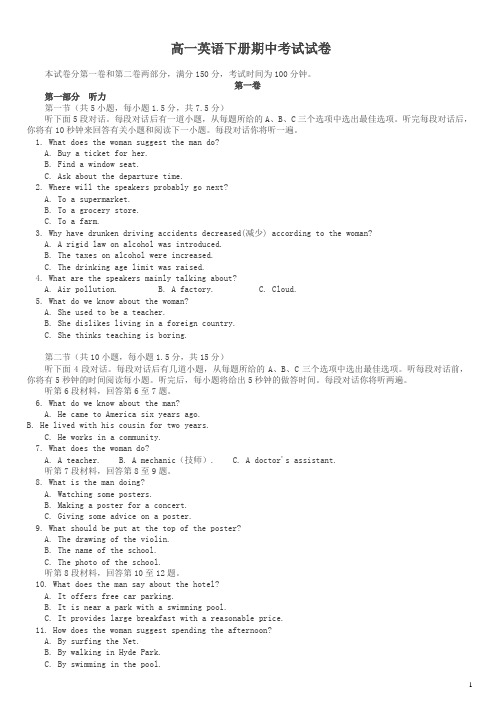
高一英语下册期中考试试卷本试卷分第一卷和第二卷两部分,满分150分,考试时间为100分钟。
第一卷第一部分听力第一节(共5小题,每小题1.5分,共7.5分)听下面5段对话。
每段对话后有一道小题,从每题所给的A、B、C三个选项中选出最佳选项。
听完每段对话后,你将有10秒钟来回答有关小题和阅读下一小题。
每段对话你将听一遍。
1. What does the woman suggest the man do?A. Buy a ticket for her.B. Find a window seat.C. Ask about the departure time.2. Where will the speakers probably go next?A. To a supermarket.B. To a grocery store.C. To a farm.3. Why have drunken driving accidents decreased(减少) according to the woman?A. A rigid law on alcohol was introduced.B. The taxes on alcohol were increased.C. The drinking age limit was raised.4. What are the speakers mainly talking about?A. Air pollution.B. A factory.C. Cloud.5. What do we know about the woman?A. She used to be a teacher.B. She dislikes living in a foreign country.C. She thinks teaching is boring.第二节(共10小题,每小题1.5分,共15分)听下面4段对话。
湖南师大附中2018-2019学年高一下学期期中考试英语试卷(PDF版)
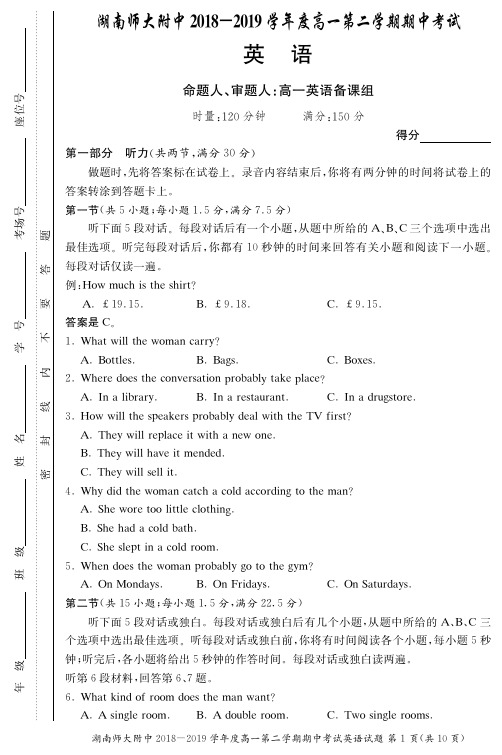
HOcCtX!7\`'eHIu"5JURSTopqkFm Ov,Rwxg"v,)!
,!2+3.=,59&A0&&(9&/-.+/(35'35.
"!"-,574/0&&(! #!"9&)<4/0&&(!
$!?'&-,574/0&&(-!
0/
21
31
!"#$%&!"#$%!"#&'()*+,-'..&/01203 ,# 45#"4
$!?&&09/0-&(/A&&9A&0.+/,09&7! #&!%&' (,7+..+/*&);4/;0&<3<46A//4,5.+//59
"!"5706!
#!B3.,-A,/9!
$!?,0/9!
!"!2+3.9&'/=5&'3<&)..+/'3,./0
"!%/4&-..+/*&);4/J-9&7! #!%/(,-)59/0-.&&9.+/*&);4/! $!%/&546=5/'34,..4/E0/5*+! .6/-789:56789('9 .(25#":3;:3!!'989!'9 jkPz{|YU
湖南师大附中2022-2021学年度高一第一学期期中考试英语试题-(这是边文,请据需要手工删加)(湖南师大附中2022-2021学年度高一第一学期期中考试英语时量:120分钟满分:150分得分____________第一部分听力(共两节,满分30分)做题时,先将答案标在试卷上。
录音内容结束后,你将有两分钟的时间将试卷上的答案转涂到答题卡上。
第一节(共5小题;每小题1.5分,满分7.5分)听下面5段对话。
每段对话后有一个小题,从题中所给的A、B、C三个选项中选出最佳选项,并标在试卷的相应位置。
听完每段对话后,你都有10秒钟的时间来回答有关小题和阅读下一小题。
每段对话仅读一遍。
例:How much is the shirt?A. £19.15.B. £9.18.C. £9.15.答案是C。
1. Where are the two speakers?A. In Canada.B. In the U.S.C. In Mexico.2. What's the relationship between the two speakers?A. Classmates.B. Friends.C. Brother and sister.3. What are the speakers mainly discussing?A. Careers.B. Health problems.C. Types of hospitals.4. When does the man want to go to the library?A. On Saturday.B. On Sunday.C. On Monday.5. How does the man usually go to work?A.By train. B. By bus. C. By plane.其次节(共15小题;每小题1.5分,满分22.5分)听下面5段对话或独白。
2015-2016学年湖南师大附中高一下学期末考试-英语
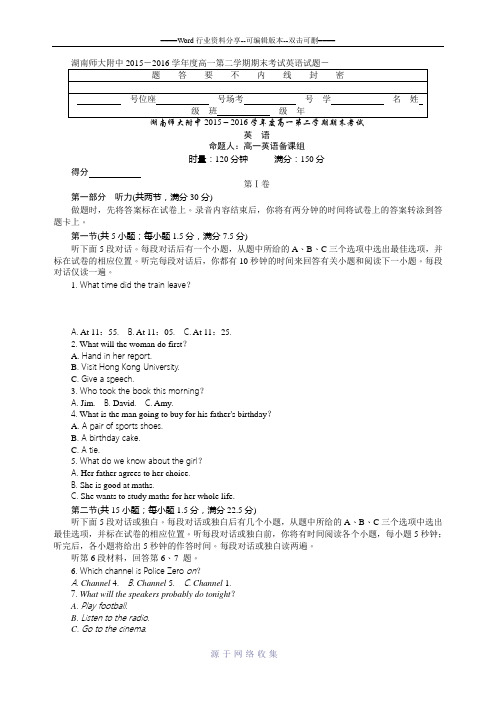
英语命题人:高一英语备课组时量:120分钟满分:150分得分第Ⅰ卷第一部分听力(共两节,满分30分)做题时,先将答案标在试卷上。
录音内容结束后,你将有两分钟的时间将试卷上的答案转涂到答题卡上。
第一节(共5小题;每小题1.5分,满分7.5分)听下面5段对话。
每段对话后有一个小题,从题中所给的A、B、C三个选项中选出最佳选项,并标在试卷的相应位置。
听完每段对话后,你都有10秒钟的时间来回答有关小题和阅读下一小题。
每段对话仅读一遍。
1. What time did the train leave?A. At 11:55.B. At 11:05.C. At 11:25.2. What will the woman do first?A. Hand in her report.B. Visit Hong Kong University.C. Give a speech.3. Who took the book this morning?A. Jim.B. David.C. Amy.4. What is the man going to buy for his father's birthday?A. A pair of sports shoes.B. A birthday cake.C. A tie.5. What do we know about the girl?A. Her father agrees to her choice.B. She is good at maths.C. She wants to study maths for her whole life.第二节(共15小题;每小题1.5分,满分22.5分)听下面5段对话或独白。
每段对话或独白后有几个小题,从题中所给的A、B、C三个选项中选出最佳选项,并标在试卷的相应位置。
听每段对话或独白前,你将有时间阅读各个小题,每小题5秒钟;听完后,各小题将给出5秒钟的作答时间。
湖南师范大学附属中学2015-2016学年高二下学期期中考试英语试题
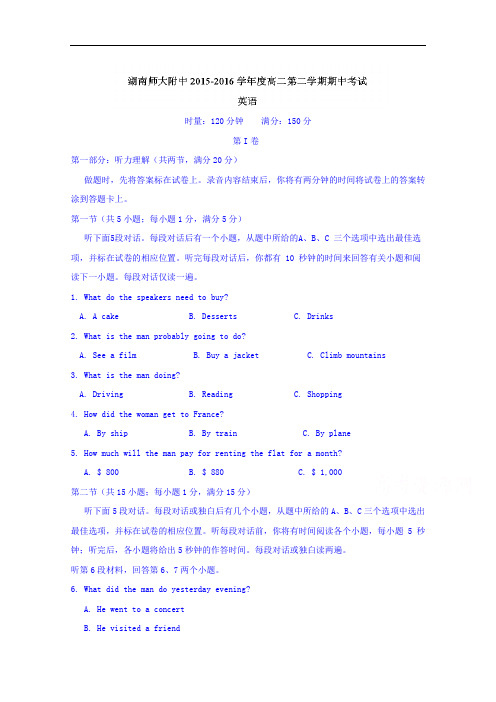
时量:120分钟满分:150分第I卷第一部分:听力理解(共两节,满分20分)做题时,先将答案标在试卷上。
录音内容结束后,你将有两分钟的时间将试卷上的答案转涂到答题卡上。
第一节(共5小题;每小题1分,满分5分)听下面5段对话。
每段对话后有一个小题,从题中所给的A、B、C 三个选项中选出最佳选项,并标在试卷的相应位置。
听完每段对话后,你都有 10 秒钟的时间来回答有关小题和阅读下一小题。
每段对话仅读一遍。
1. What do the speakers need to buy?A. A cakeB. DessertsC. Drinks2. What is the man probably going to do?A. See a filmB. Buy a jacketC. Climb mountains3. What is the man doing?A. DrivingB. ReadingC. Shopping4. How did the woman get to France?A. By shipB. By trainC. By plane5. How much will the man pay for renting the flat for a month?A. $ 800B. $ 880C. $ 1,000第二节(共15小题;每小题1分,满分15分)听下面5段对话。
每段对话或独白后有几个小题,从题中所给的A、B、C三个选项中选出最佳选项,并标在试卷的相应位置。
听每段对话前,你将有时间阅读各个小题,每小题5秒钟;听完后,各小题将给出5秒钟的作答时间。
每段对话或独白读两遍。
听第6段材料,回答第6、7两个小题。
6. What did the man do yesterday evening?A. He went to a concertB. He visited a friendC. He watched a movie7. When did the movie start?A. 7:20 p.m.B. 7:40 p. m.C. 8:00 p.m.听第7段材料,回答第8至10三个小题。
2015-2016学年度第二学期高一英语期中试题和参考答案
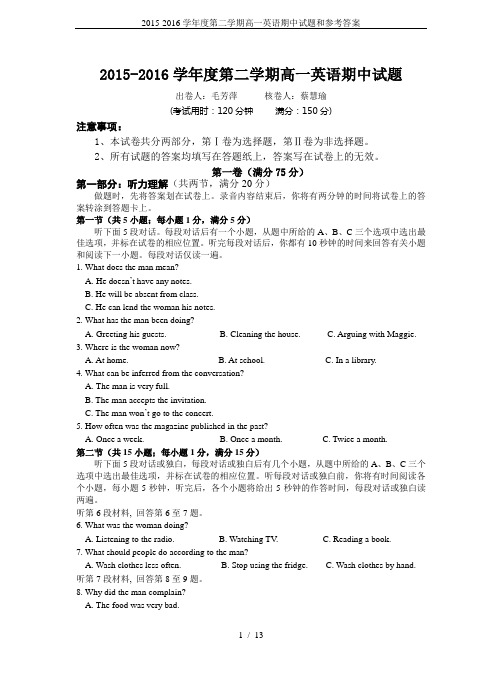
2015-2016学年度第二学期高一英语期中试题出卷人:毛芳萍核卷人:蔡慧瑜(考试用时:120分钟满分:150分)注意事项:1、本试卷共分两部分,第Ⅰ卷为选择题,第Ⅱ卷为非选择题。
2、所有试题的答案均填写在答题纸上,答案写在试卷上的无效。
第一卷(满分75分)第一部分:听力理解(共两节,满分20分)做题时,先将答案划在试卷上。
录音内容结束后,你将有两分钟的时间将试卷上的答案转涂到答题卡上。
第一节(共5小题;每小题1分,满分5分)听下面5段对话。
每段对话后有一个小题,从题中所给的A、B、C三个选项中选出最佳选项,并标在试卷的相应位置。
听完每段对话后,你都有10秒钟的时间来回答有关小题和阅读下一小题。
每段对话仅读一遍。
1. What does the man mean?A. He doesn’t have any notes.B. He will be absent from class.C. He can lend the woman his notes.2. What has the man been doing?A. Greeting his guests.B. Cleaning the house.C. Arguing with Maggie.3. Where is the woman now?A. At home.B. At school.C. In a library.4. What can be inferred from the conversation?A. The man is very full.B. The man accepts the invitation.C. The man won’t go to the concert.5. How often was the magazine published in the past?A. Once a week.B. Once a month.C. Twice a month.第二节(共15小题;每小题1分,满分15分)听下面5段对话或独白,每段对话或独白后有几个小题,从题中所给的A、B、C三个选项中选出最佳选项,并标在试卷的相应位置。
湖南师大附中2015届高三月考英语试卷 (一) (word版)

湖南师大附中2015届高三月考英语试卷(一)本试卷分为四个部分,包括听力、语言知识运用、阅读和书面表达。
时量120分钟。
满分150分。
Part ⅠListening Comprehension(30 marks)Section A (22.5 marks)Directions: In this section, you w ill hear six con v ersations bet w een t w o speakers. For each con v ersation, there are se v eral questions and each question is follo w ed by three choices marked A, B and C. Listen carefully and then choose the best ans w er for each question.You w ill hear each con v ersation TWICE.Con v ersation 1(B)1.What are the speakers mainly talking about?A. The woman’s high blood pressure.B. The woman’s overweight.C. The woman’s diet.(C)2.What does the man ask the woman to do?A. Eat a little bit of cookies every day.B. Have a good rest.C. Follow the diet sheet exactly every day.Con v ersation 2(A)3.What is the man probably?A. A student.B. A teacher.C. An office clerk.(C)4.Which of the following will the man do?A. Take care of children.B. Give lessons to children.C. Tell children stories.Con v ersation 3(A)5.What special day is it today?A. Earth Day.B. Tree Planting Day.C. The woman’s birthday.(B)6.What will the man do?A. Plant a tree.B. Buy a bus pass.C. Take shorter showers.Con v ersation 4(B)7.Where does the conversation take place?A. In a library.B. In a book store.C. In a school.(C)8.What did the woman find in a book?A. An old envelope.B. A photograph.C. A signature.(A)9.How much will the man pay for the novel?A. 75 cents.B. 50 cents.C. 19 cents.Con v ersation 5(C)10.Where has the man been to recently?A. America.B. Britain.C. Australia.(A)11.What does the man think of the weather there?A. Nice.B. Changeable.C. Awful.(B)12.When is the best time to visit there?A. In August.B. In December.C. In January.Con v ersation 6(B)13.Whom does the man plan to give lessons to this summer?A. People in China.B. Some immigrants.C. Overseas Chinese students.(A)14.What do the man’s students want to learn now?A. Spoken English.B. English reading.C. English writing.(C)15.Why does the man know so much about English teaching?A. He majored in it.B. He read a lot about it.C. He took a course in it.Section B (7.5 marks)Directions: In this section, you w ill hear a short passage. Listen carefully and then fill in the numbered blanks w ith the information you ha v e heard. Fill in each blank w ith NO MORE THAN THREE WORDS.You w ill hear the short passage TWICE.Part ⅡLanguage Knowledge(45 marks)Section A (15 marks)Directions: For each of the follo w ing unfinished sentences there are four choices marked A, B, C and D. Choose the one that best completes the sentence.(C)21.—Is the manager available tomorrow afternoon?—No, he is busy. Otherwise he ________ the meeting.A. had attendedB. would have attendedC. would attendD. could have attended【解析】虚拟语气,表示与将来事实相反(tomorrow afternoon)。
- 1、下载文档前请自行甄别文档内容的完整性,平台不提供额外的编辑、内容补充、找答案等附加服务。
- 2、"仅部分预览"的文档,不可在线预览部分如存在完整性等问题,可反馈申请退款(可完整预览的文档不适用该条件!)。
- 3、如文档侵犯您的权益,请联系客服反馈,我们会尽快为您处理(人工客服工作时间:9:00-18:30)。
湖南师大附中2015-2016学年度高一第二学期期中考试英语时量:120分钟满分:150分得分第Ⅰ卷第一部分听力(共两节,满分30分)做题时,先将答案标在试卷上.录音内容结束后,你将有两分钟的时间将试卷上的答案转涂到答题卡上。
第一节(共5小题;每小题1.5分,满分7.5分)听下面5段对话.每段对话后有一个小题,从题中所给的A,B,C三个选项中选出最佳选项,并标在试卷的相应位置.听完每段对话后。
你都有10秒钟的时间来回答有关小题和阅读下一小题.每段对话仅读一遍.例:How much is the shirt?A. £ 19.15.B. £ 9.18.C. £ 9.15.答案是 C。
1. What does the woman want to do?A. To return the dress.B. To buy her friend a dark dress.C. To change the dark dress for a white one.2. When will the speakers probably leave for the airport?A. At 8:30.B. At 8:35.C. At 10:00.3. What date can the man get tickets for?A. April 9th.B. April 8th.C. April 19th.4. What will Linda do tomorrow afternoon?A. To go shopping.B. To clean the house.C. To care for her grandmother.5. What will the man do next?A. To wash dishes.B. To prepare dinner.C. To watch a show.第二节(共15小题;每小题1.5分,满分22.5分)听下面5段对话或独白.每段对话或独白后有几个小题,从题中所给的A,B,C三个选项中选出最佳选项.并标在试卷的相应位置。
听每段对话或独白前。
你将有时间阅读各个小题,每小题5秒钟;听完后,各小题将给出5秒钟的作答时间.每段对话或独白读两遍。
听第6段材料,回答第6,7题。
6. What will the two speakers do?A. To go climbing.B. To go swimming.C. To play football.7. Why can't the woman have dinner with the man?A. Because she doesn't like the restaurant.B. Because she will eat with her grandparents.C. Because she will visit her parents.听第7段材料,回答第8,9题.8. What is the possible relationship between the two speakers?A. Classmates.B. Doctor and patient.C. Teacher and student.9. What is the possible reason for Alice's becoming near-sighted?A. Lacking Vitamin A.B. Wearing improper glasses.C. Using eyes too much.听第8段材料,回答第10至12题。
10. What will the man do?A. To go on a business trip.B. To return to his hometown.C. To move to another place of the city.11. Who has booked the ticket for Jack?A_ The woman. B. Tom. C. Himself.12. When will the two speakers have dinner together?A. This Friday.B. This Thursday.C. Next Thursday.听第9段材料,回答第13至16题。
13. Where was Thomas Chinn born?A. In China.B. In the UK.C. In Japan.14. What was Thomas Chinn's dream at first?A. To be a teacher.B. To be a doctor.C_ To be a chef .15. Who is the best chcf on television, according to Thomas Chinn?A. Jamie Oliver.B. Gordon Ramsay.C. His grandmother.16. What will make Thomas Chinn different?A. Being good at cooking simple food.B. Being the host of a successful cooking and travel show.C. The experience of studying abroad and his family circle.听第10段材料,回答第11至20题。
17. When was the museum started?A. In 2007.B. In 2003.C. In 2000.18. If Dr. Farwell saw a fellow at the university. what did he usually do?A. To wave to him.B. To make fun of him.C. To give him a big slap on the back.19. What did Dr. Farwell dress as at the costume party?A. A farmer.B. A teacher.C. A clown.20. Where was the party held?A. In Mary's house.B. At the Jelwell Museum.C. On the Liberty campus.第二部分阅读理解(共两节,满分40分)第一节(共15小题;每小题2分,满分30分)阅读下列短文,从每题所给的四个选项(A、B、C和D)中,选出最佳选项,并在答题卡上将该项涂黑。
A(A)Restaurant Supervisor Waiters TelephonistThe ideal candidates must have relevant experiences gained in a high quality hotel. Please call Personnel on 071-722-7722, or send your CV to:Regents Park Hilton, Lodge Road. London. NW87.LondonRegents ParkHilton.(B)USE YOUR LANGUAGE AND EARN £ 450- £ 1200 /WeeklyWe are one of the largest business publishers in Europe and have limited positions for intelligent young people in our London advertisement sales office. Enquiries from German, Spanish and Eastern European speakers especially welcome.Phone on 071-753-4300.(C)BABYSITTER WANTFor a 9-month-old.3 days per week.Some hours flexibility(弹性,灵活度)required.Knowledge German/French advantage not necessary.071-221-7375.(D)Planet HollywoodLondonJoin the Stars! Food serversThe biggest and busiest restaurant in London is seeking additional stars for its team of dedicated professionals. If you have experience in high volume restaurants and are looking for a challenge. then come on down for an audition(面试).Interview day is on Friday 6th May from 12 noon to 7 p. m.Planet Hollywood is located at 13 Coventry Street. London. WI.21. How many advertisements arc for waiters?A. One.B. Two.C. Three.D. Four.22. According to advertisement B, we can learn thatA. only German. Spanish and Eastern European speakers are neededB. the job offers £ 450- £ 1200 per monthC. the job is open to people of all agesD. you may call to get more information about the job23. In advertisement C. the babysitter shouldA. have 9 months' working experienceB. speak German or FrenchC. accept flexible working hoursD. work at least four days a weekBMy grandfather spent most of his life in a turbulent (动乱的) India. After settling in New York, he took up his true passion: gardening. Grandfather's garden was where I took refuge (避难) from a world of adults and schoolwork. My grandfather planted squash (南瓜) ) and tomatoes-it was not rare to find me somewhere in the garden. either secretly eating a tomato. or just sitting and admiring my grandfather's hard work. However, as time went by. I did not have the chance to visit his house as often as I used to.On my eleventh birthday. I received a gift bag wrapped in pretty paper from my grandfather. Excited to see what he had given to me for my birthday. I tore apart the paper only to find a yellow squash. I was very angry. What a stupid present!But gradually. I realized that in my developing a relationship with his garden. I had unknowingly grown very close to my grandfather himself. something he wished to remind me of through his gift. His commitment towards doing things definitely influenced me. It could bring him a sense of accomplishment. Because of him. I try to model the idea of approaching everything with both drive and passion.My grandfather passed away five years ago, but his influence on me could not be bigger than it is today. As I prepare to enter college and move on from my relatively sheltered high school life toward achieving complete independence. allowing my passions to find their way into whatever I may be doing will be very necessary. I still look up to my grandfather very much to this day. and I hope that one day I will be able to sow in my own garden. and give someone else a squash on his or her birthday. I hope it will be similar to the most meaningful gift from my grandfather.24. When the author was young. she often visited the garden mainly toA. have a taste of her favorite vegetablesB. help her grandfather cultivate the gardenC. escape from the adults and schoolworkD. admire her grandfather's hard work25. When the author saw the squash gift from her grandfather. she wasA. excitedB. confusedC. curiousD. upset26. What can we know from the passage?A. The grandfather started to be passionate about gardening in India.B. The grandfather did the gardening to remember his youth.C. The author will sow a garden immediately she graduates from college.D. The author will live her life with passion in the future.27. What's the best title for the text?A. Meaningful Gift from GrandfatherB. Grandfather and His GardeningC. My Life with GrandfatherD. Gardening and LifeCWhat is it that makes a house a home? A home is a place of companionship with people in it who love each other. who are harmonious and closer inside with one another than they are outside with those in the workplace or with classmates at school. A home is a place of companionship that it's difficult to leave. In a home there is love. sharing and appreciation. and the members help each other.I have seen families on the street. But if they live, sleep, talk, and eat together, they are a family, even if they are poorly off. You don't need a roof to make a home. The truly homeless are some of the rich people who build multi-million-dollar houses and are too busy to live inthem. The truly homeless are those who have turned their home into a hotel lobby. They don't talk and eat together every day. They rarely see each other. The truly homeless people are those with babysitters, caretakers, gardeners and maids. Parents arc unaware, too busy making money outside the home that they don't live in. This is another way of looking at the rich and the homeless. Who is to be pitied?Control of the computer and the Internet is also important to make a house into a home. If the computer is on all the time, the house turns into an office, even if everyone is at home. Many homes these days are just offices. Human communication has stopped. The computer eats up the time that one should be giving to others withinthe home. Using the computer moderately gives us time for gentleness, play and communication, not with a screen, but with a human being.28. The purpose of the first paragraph is toA. tell us the author's concept of homeB. tell us that where there is home there is loveC. tell us what people think home isD. tell people how to have a happy home29. The underlined word "those" in the second paragraph refers toA. people who build multi-million-dollar housesB. people who have lost their family membersC. people who don't spend time with the familyD. homeless families living on the street in America30. According to the passage, we can know the following exceptA. a home is a place where you are willing to stayB. computers and the Internet are important for a happy familyC. even the poorest person can have a happy homeD. sometimes it's the rich that should be pitied31. According to the passage, what is NOT mentioned as an element of a home?A. Communication.B. Appreciation.C. Companionship.D. Wealth.DOf all the ancient people of the Americas, the Inca, along with the Olmecs and Toltecs, are among the most mysterious. While the latter two, who lived centuries and perhaps even millennia(千年) ago in central America and seem to have disappeared without a trace, the Inca are well known to have arrived in Cuzco, present day Peru about the year 1200 AD.The fall of the Inca civilization was not the result of natural, normysterious forces, but from a very real human enemy, the Spanish, who arrived in 1532 and took over the Inca's world by 1533. However, what is not well known is where they came from, and also what they looked like.It is well documented that the Inca left the city of Tiwanaku in present day Bolivia about the year 1000 AD; the result of a 40 year El Nino caused drought and attacks by neighboring Aymara tribal people.The first Inca. Manco Gapac and Mama Occlo. who founded the city of Cuzco, Were not only husband and wife,but also brother and sister. Their first born son, Sinchi Roca, in turn married his full blood sister. This trend of inbreeding(同系婚姻) continued up until the conquest of the Inca by the Spanish.And what about the shaved heads? The Inca had elongated (伸长的) heads, with brain capacity as much as twice the average human. The oral tradition to this is that the Inca saw this as asign of superior intelligence, and a reflection on what their ancestors looked like.32. What caused the disappearance of Inca civilization?A. The control of the Spanish.B. The natural disasters.C. The mysterious forces.D. The unknown illness.33. One reason why the Inca left Tiwanaku is thatA. thcy were often attacked by wild animalsB. they suffered a drought caused by El NinoC. they found their marriage illegal thereD. they had to avoid the capture by the Spanish34. Why do the Inca have the shaved heads?A. To leave an impression on their enemies.B. To express their racial superiority.C. To avoid heat in hot weather.D. To show respect for their ancestors.35. The main idea of the passage is aboutA. the introduction of true Inca civilizationB. the mysterious disappearance of Inca civilizationC. the social customs of the Inca civilizationD. the influence of the Inca civilization on the world第二节(共5小题;每小题2分,满分10分)根据短文内容,从短文后的选项中选出能填入空白处的最佳选项,选项中有两项为多余选项。
